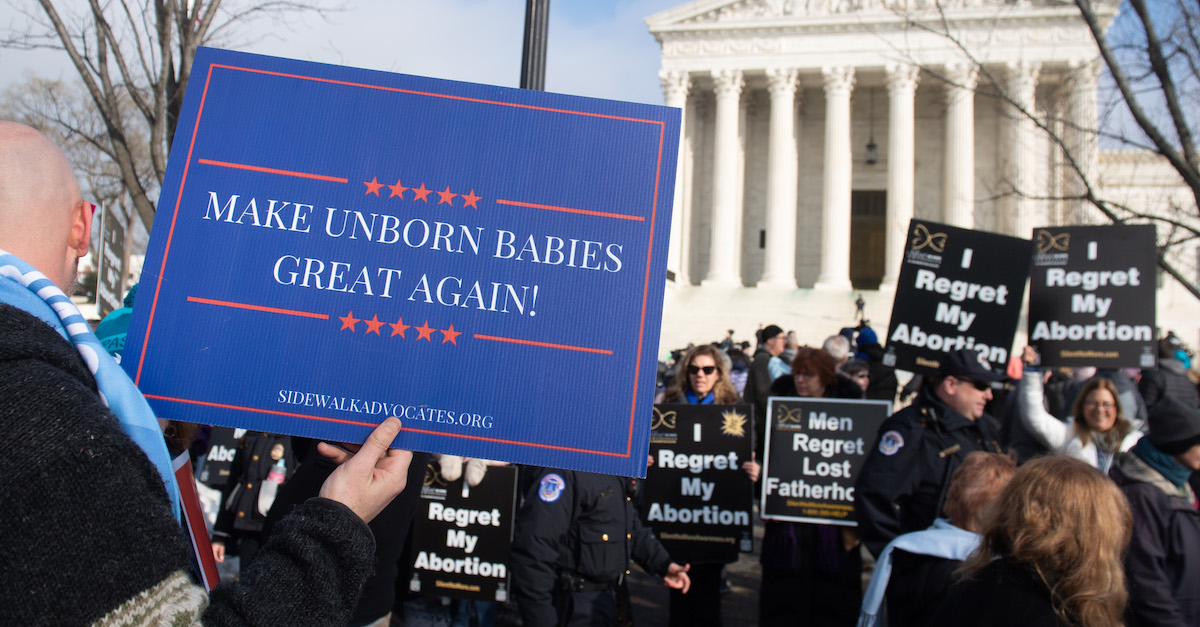
The Seventh Circuit just sent a pretty blunt message to the Supreme Court: its rubric for analyzing abortion law stinks, and the Seventh Circuit has neither the time nor the inclination to clean up the mess SCOTUS created.
The case is Planned Parenthood of Indiana and Kentucky, Inc. v. Kristina Box, Commissioner, Indiana State Department of Health, et al., and it’s about a 2017 revision to Indiana’s abortion law.
Senate Enrolled Act 404 would remove an option for minors to petition a judge to grant permission to have an abortion without parental consent. The revision would likely only affect a small group of young women; the vast majority – indeed, in 2015, 96-percent of Indiana minors who sought abortions – proceed with the consent of their parents. The change would mean that the few who might pursue court approval to proceed without parental consent would no longer have the option to even request “judicial bypass.”
The ACLU took up the case against the change in law, arguing that requiring all minors to obtain parental consent without exception could prove harmful to some – particularly those who are victims of domestic abuse. In that context, the stringent law would constitute an “undue burden” on the First Amendment right to have an abortion.
U.S. District Court Judge Sarah Evans Barker agreed and issued a preliminary injunction in 2017; as a result, the law was prevented from going into effect.
The State of Indiana appealed Judge Barker’s injunction, and a three-judge panel of the Seventh Circuit Court of Appeals upheld her order, agreeing that the parental consent requirement constituted an undue burden. The judges, however, were not of one mind. Judge Michael Kanne dissented, writing that the law’s challengers hadn’t provided nearly enough evidence to that the law was burdensome. That law, after all, hadn’t actually affected anyone yet. Still, the injunction remained in place after the 2-1 vote.
Indiana tried yet again, this time requesting a rehearing by the full (en banc) Seventh Circuit. Wednesday, writing for the full appellate court, Circuit Judge Frank H. Easterbrook refused Indiana’s request. The judges, it appears, aren’t all that comfortable exercising their judgment when it comes to teenage girls and abortion.
In essence, the court denied rehearing on the grounds that no one is likely to agree about what “undue burden” really means. Apparently, one judge’s undue burden is another’s minor inconvenience. When the case was presented to the three-judge panel, even those three couldn’t agree, so there’s little reason to think a larger bench would mean more agreement.
I’ve got to hand it to the Seventh Circuit – this is virtuoso-level passing of the buck. If there’s anything about which we can we can all agree, it’s that when abortion is the issue, no one agrees about anything. On that basis, the court punted the entire matter up to SCOTUS, remarking that since it created this unmanageable legal standard, it should be the one to make the tough calls:
Only the Justices, the proprietors of the undue-burden standard, can apply it to a new category of statute, such as the one Indiana has enacted. Three circuit judges already have guessed how that inquiry would come out; they did not agree. The quality of our work cannot be improved by having eight more circuit judges try the same exercise. It is better to send this dispute on its way to the only institution that can give an authoritative answer.
Since the Seventh Circuit appears uncomfortable exercising its judgment, I’m going to go ahead and exercise mine.
Judge Easterbrook’s claim that an injunction stopping a law from going into effect “prevents the judiciary from knowing what a law really does” is silly in this context. It hardly takes a soothsayer to predict that with this law some pregnant teenager will be beaten at home when she attempts to get parental permission for an abortion. We all know that parental consent looks quite different in dysfunctional families than it does in healthy ones. We also know that, in some cases, the requirement of parental consent can have positive impact. Whether the burden outweighs the benefit is a determination worthy of weighty consideration, and it’s certainly not a call for which I’d want to be responsible. Glad Judge Easterbrook and I could agree.
[image via Saul Loeb/AFP/Getty Images]
This is an opinion piece. The views expressed in this article are those of just the author.